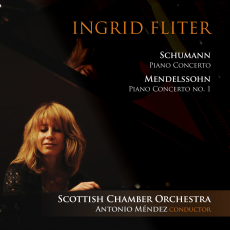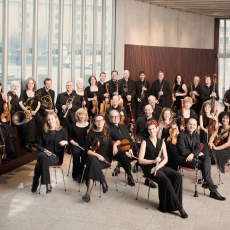Ingrid Fliter & SCO - Schumann & Mendelssohn: Piano Concertos - The Telegraph
On disc, Ingrid Fliter has so far made the music of Chopin her main focus of attention with sublime interpretations of the concertos and preludes for the Linn label, and the complete waltzes and other works for EMI, all of them attesting to the uncommon sensitivity and lustre of her playing. Here she steps sideways to two of Chopin's exact contemporaries with performances of Schumann's Piano Concerto and the G minor Concerto by Mendelssohn which reveal that her affinities lie equally with the broader spectrum of the early Romantics.
Chopin and Schumann were both born in 1810, Mendelssohn in 1809. All three of them, together with Liszt (born in 1811), were at the forefront of the piano's burgeoning popularity in the early 19th century and were beneficiaries of the rapid advancements in piano technology and manufacture, the new iron frame lending the instrument more power and further possibilities for tonal colour. Schumann, nevertheless, once said that he would like to "smash the piano" because he wanted it to achieve even more than he could get out of it, but with his extraordinary, poetic imagination and his insight into the piano's expressive potential, it is clear that he reached an accord with its capabilities. The A minor Concerto, completed in 1845, is a wonderful example both of his inspiration and of his pianistic resourcefulness, not to mention his deft orchestral touch of which the Scottish Chamber Orchestra under the Spanish conductor Antonio Mendez gives a radiant, animated account here, establishing a genuine sense of dialogue with the piano.
Fliter is also in her element. Hers is a reading of firm, exhilarating impulse, at the same time taking its cue from the lyrical heart of the music and glowing with the limpid touch, golden timbre and subtle nuances that are hallmarks of her playing.
The Mendelssohn concerto is a very different beast, lyrical at its core but, in the outer movements at any rate, with a much more pronounced predilection for the thrill of the chase and for elements of pianistic display. Once again, Fliter has the measure of the work. The first movement has real fire; the finale bears a cheerful smile and sizzles with vitality; and the central, song-without-words, Andante, is played with heart-stopping tenderness and warmth.
With The Fair Melusina overture dynamically performed by the SCO, this is a compelling recording.



